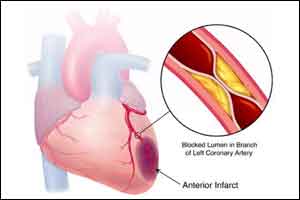- Home
- Editorial
- News
- Practice Guidelines
- Anesthesiology Guidelines
- Cancer Guidelines
- Cardiac Sciences Guidelines
- Critical Care Guidelines
- Dentistry Guidelines
- Dermatology Guidelines
- Diabetes and Endo Guidelines
- Diagnostics Guidelines
- ENT Guidelines
- Featured Practice Guidelines
- Gastroenterology Guidelines
- Geriatrics Guidelines
- Medicine Guidelines
- Nephrology Guidelines
- Neurosciences Guidelines
- Obs and Gynae Guidelines
- Ophthalmology Guidelines
- Orthopaedics Guidelines
- Paediatrics Guidelines
- Psychiatry Guidelines
- Pulmonology Guidelines
- Radiology Guidelines
- Surgery Guidelines
- Urology Guidelines
Instant blood test for diagnosis of heart attack

All the patients reporting Emergency Room with complaints of chest pain are anxious to know whether they are suffering from Myocardial Infarction or not and invariably in around nine in ten cases, the signs are a false alarm - and can signal something as harmless as indigestion. Scientists from King's College London have now developed a new test which is far more sensitive and could give accurate diagnosis on the spot and rule out a heart attack in under 20 sensitive and could give accurate diagnosis on the spot and rule out a heart attack in under 20 minutes.
Thomas E. Kaier t al. in an article published in Circulation have highlighted that Cardiac myosin-binding protein C (cMyC) is a cardiac-restricted protein that is more abundant than cardiac troponins (cTn) and is released more rapidly following acute myocardial infarction (AMI). They evaluated cMyC as an adjunct or alternative to cTn in the early diagnosis of AMI. Levels of cMyC (cardiac myosin-binding protein C) in the blood rise more rapidly and to a higher extent after a heart attack than troponin proteins.
That means doctors can use the new test to rule out a heart attack in a higher proportion of patients straightaway
At present patients with suspected MI and a clear ECG are subjected to a blood test, called troponin, when they arrive at A&E. But this test needs to be repeated three hours later to pick up signs of heart muscle damage and rule out MI.
The researchers measured concentrations of cMyC and high (hs) and standard (s) sensitivity cTn in 1954 unselected patients presenting to the emergency department with symptoms suggestive of AMI. The final diagnosis of AMI was independently adjudicated using all available clinical and biochemical information without knowledge of cMyC. The prognostic endpoint was long-term mortality.
In 340 patients (17%) the final diagnosis was AMI and concentrations of cMyC at presentation were significantly higher in those with vs. without AMI . Discriminatory power for AMI, as quantified by the area under the receiver-operating characteristic curve was comparable for cMyC and superior to cTnI measured by a contemporary sensitivity assay .The results inferred that use of cMyC more accurately classified patients with a single blood test into rule-out or rule in categories.
The new test can be performed at onset of symptoms as it has better discriminating ability between heart attacks and other causes of chest pains.It was better at giving patients the all-clear within the first three hours of presenting with chest pain.It has the potential to reassure anxious patients with a single test and saving unnecessary utilization of hospital beds resources and technical manpower.
http://circ.ahajournals.org/content/early/2017/09/13/CIRCULATIONAHA.117.028084

Disclaimer: This site is primarily intended for healthcare professionals. Any content/information on this website does not replace the advice of medical and/or health professionals and should not be construed as medical/diagnostic advice/endorsement or prescription. Use of this site is subject to our terms of use, privacy policy, advertisement policy. © 2020 Minerva Medical Treatment Pvt Ltd